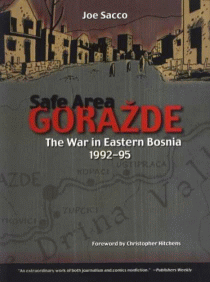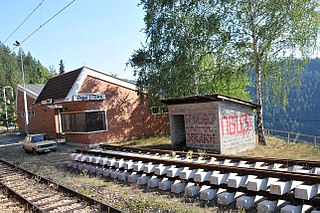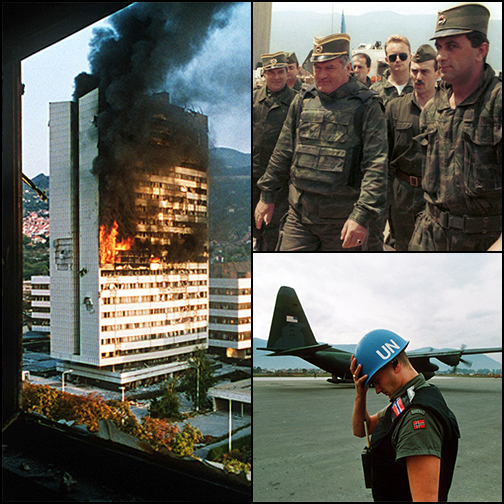
Goražde is a city and the administrative center of Bosnian-Podrinje Canton Goražde of the Federation of Bosnia and Herzegovina, an entity of Bosnia and Herzegovina. It is situated on the banks of Drina river. As of 2013, it has a population of 20,897 inhabitants.

Podrinje is the Slavic name of the Drina river basin, known in English as the Drina Valley, located in Bosnia and Herzegovina and Serbia.

Operation Southeast Croatia was a large-scale German-led counter-insurgency operation conducted in the southeastern parts of the Independent State of Croatia, during World War II. It was the first of two German-led operations targeting mainly Yugoslav Partisans in eastern Bosnia between 15 January and 4 February 1942. Several days after the conclusion of Operation Southeast Croatia, a follow-up operation known as Operation Ozren was carried out between the Bosna and Spreča rivers. Both operations also involved Croatian Home Guard and Italian troops and are associated with what is known as the Second Enemy Offensive in post-war Yugoslav historiography. The Second Enemy Offensive forms part of the Seven Enemy Offensives framework in Yugoslav historiography.

Safe Area Goražde is a journalistic comic book about the Bosnian War, written by Joe Sacco. It was published in 2000.

Novo Goražde, also known as Ustiprača, is a village and municipality located in Republika Srpska, an entity of Bosnia and Herzegovina. As of 2013, it has a population of 3,117 inhabitants. It was split from the pre-existing municipality of Goražde and given to Republika Srpska by the Dayton Agreement. The other part of the pre-war municipality is now in the Federation of Bosnia and Herzegovina.

Žepa is a small town on the short river with a same name, the Žepa river, in eastern Bosnia and Herzegovina, in the municipality of Rogatica, in the Republika Srpska entity. It is located northeast of Rogatica itself, southwest of Srebrenica and northwest of Višegrad. It lies on the small river Žepa that flows into the Drina river nearby, in a valley between the mountains Javor and Devetak.

Milan Lukić is a former head of the Serb paramilitary group known as White Eagles who was found guilty by the International Criminal Tribunal for the Former Yugoslavia (ICTY) in July 2009 of crimes against humanity and violations of war customs committed in the Višegrad municipality of Bosnia and Herzegovina during the Bosnian war and sentenced to life in prison.

The Višegrad massacres were acts of mass murder committed against the Bosniak civilian population of the town and municipality of Višegrad during the ethnic cleansing of eastern Bosnia by Serb police and military forces during the spring and summer of 1992, at the start of the Bosnian War.
The A1 Liga is a second tier of men's basketball competition in Bosnia and Herzegovina that sits below the Basketball Championship of Bosnia and Herzegovina (Prvenstvo Bosne i Hercegovine), composed of three regional divisions: A1 liga Bosne i Hercegovine, A1 liga Herceg-Bosne, and 1. Muška Liga Republike Srpske.

The First Corps was one of seven units of the Army of the Republic of Bosnia and Herzegovina established in 1992, in the early part of the Bosnian War.
Zijad Subašić was a Bosniak military leader in Višegrad during the early stage of the Bosnian War (1992–95). He was a founding member of the Patriotic League in Višegrad. After being wounded in a street battle with Serb militias in 1992, he was taken to the hospital in Foča which was still in Bosnian government control. After Foča was occupied by the Yugoslav People's Army (JNA), he was taken out of the hospital, brought back to Višegrad and murdered on the Mehmed Paša Sokolović Bridge, a historical location which was used by the Bosnian Serb Army to murder Bosniak civilians during the war. Today, Zijad Subašić is considered a hero among many former citizens of Višegrad. His body was exhumed from a mass grave and identified.
Momir Savić is a Bosnian Serb paramilitary commander convicted for war crimes committed during the ethnic cleansing of the Višegrad region of eastern Bosnia during the 1992-1995 Bosnian War.
The Paklenik massacre is the massacre of at least 50 Bosniaks by the Army of the Republika Srpska in the Rogatica Municipality on 15 June 1992.
Željko Lelek, a Bosnian Serb, was the first individual indicted for the mass rape crimes that were a feature of the expulsion of the Bosniak population of the town of Višegrad, as part of the strategic campaign of ethnic cleansing carried out in the Drina Valley in the early days of the Bosnian War.

The Štrpci massacre was the massacre of 19 civilians on 27 February 1993, taken from a Belgrade-Bar train at Štrpci station near Višegrad, on Bosnian territory. Fifteen Serbs were arrested in December 2014 and charged with war crimes for their participation in the massacre.
Borovac is a Serbo-Croatian toponym, derived from bor, "pine tree", literally meaning "place of pines". It may refer to:

The Siege of Rogatica was a joint attack of Partisan and Chetnik rebel forces on Rogatica, then held by the Independent State of Croatia. The siege continued between 13 and 24 October 1941.
The Siege of Goražde refers to engagements during the Bosnian War (1992–95) in and around the town of Goražde in eastern Bosnia.












